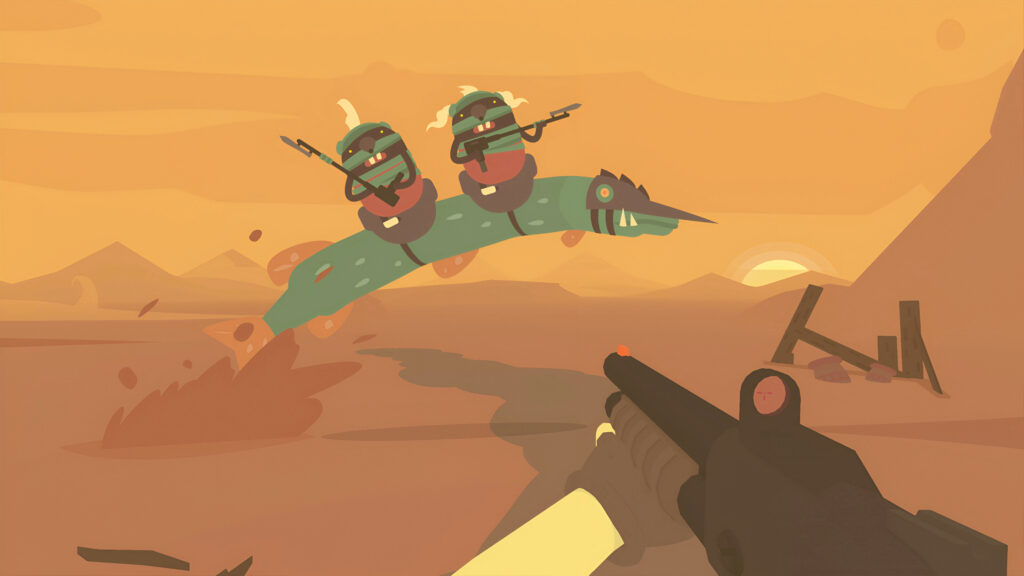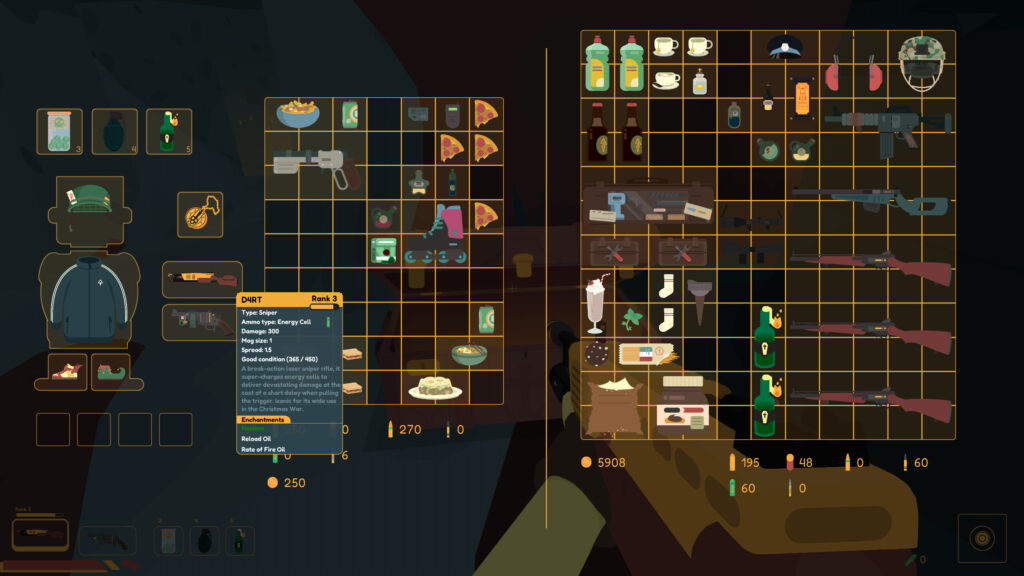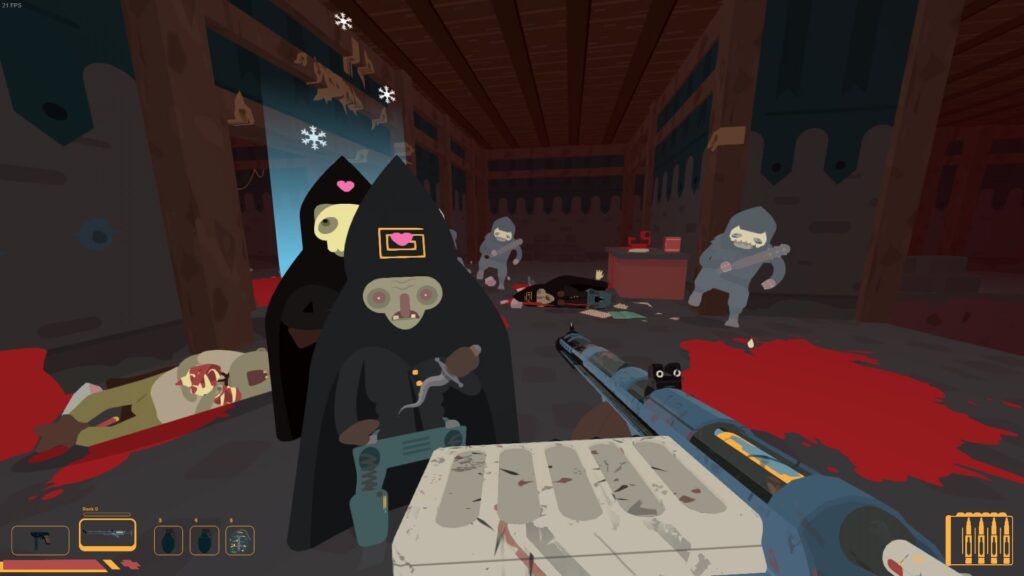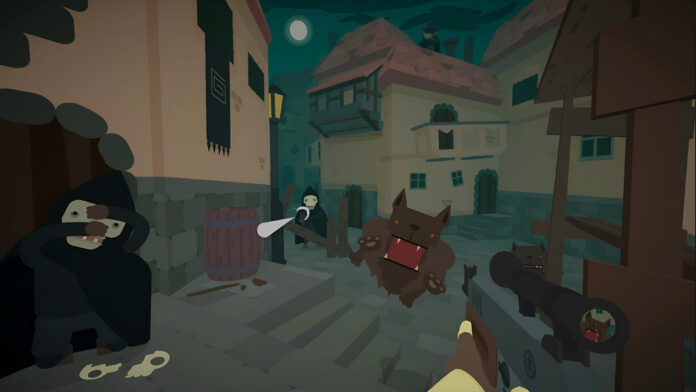Sulfur burst out of the gates when it was released on Steam end of October 2024. With over a 1,000 positive reviews in just one week, the game seems well on its way to reaching the target of 200,000 copies sold. Swedish indie developer Perfect Random promised in their early access roadmap to add multiplayer once they reach that number. “We’re cautiously optimistic,” says CEO & Co-founder Anton Albiin. “Multiplayer is something we’d love to add if it makes sense production-wise and when we can afford it. With a steady trajectory, we think hitting 200k copies within the first 6 to 8 months of Early Access could be realistic.”

Sulfur is a FPS foremost, but it’s also a roguelike and sure, sprinkle some RPG on top as well. Plus it’s absolutely bonkers to look at, with a wide variety of monsters in bright and colorful blocky graphics. A completely unique title that has rightfully managed to rise above the crowded sea of clones on Steam. “Sulfur’s uniqueness comes from its artstyle, smooth gameplay, quirky gunplay and rich customization options,” explains Albiin. “It’s also a quite difficult game, which brings friction to the minute-to-minute decision, which we find way more engaging. We have also designed it for every run to feel new thanks to a wide range of enemy mutations, loot, items, weapons, and area events.”
Perfect Random, the indie studio behind Sulfur, began as a dream project from four co-founders back in 2021. Working remotely from three different cities, Bodafors, Malmö, and Stockholm, the team found each other through game jams, industry events and shared work experiences. “Perfect Random is a philosophy, aesthetic, practically unattainable and possibly an oxymoron, which kinda suits us well, I think,” says Albiin.
Mod and wield with pride
When talking about Sulfur, Albiin describes it as “a dream mix of our favorite game elements: action-filled FPS mechanics combined with the unpredictable, high-stakes loop of a roguelike.” The game pulls inspiration from intense, loot-driven experiences like Tarkov, Noita, and Diablo, yet brings its own take on that high-risks, big-rewards gameplay. “We wanted to create a world where every encounter felt dangerous, where weapons weren’t just tools but objects players would invest in, mod, and wield with pride,” Albiin notes. “Sulfur took shape from this desire to make a roguelike that feels both unforgiving and richly rewarding, a game that respects the skill and persistence of its players.”

What sets Sulfur apart isn’t just the gameplay, but the quirky, dark tone and humor woven into its DNA. “Our fans seem to resonate with Sulfur’s challenging nature, but that it’s fair, and respects their time and skill,” Albiin says. “Of course, not everyone agrees, looking at 10-15% of our reviews.” Still, that mix of “feverish darkness, mixed with goofiness, of humor and lore” has become a signature of Sulfur and gives it a distinctive voice in the crowded roguelike market. “We didn’t just set out to make another roguelike, and I take notice!” Albiin adds with a smile.
Stupid jokes
And while we’re at it, the team has a lot to be proud of according to Albiin. “I’m most proud of our art style and the creativity that went into the weaponry, and uniqueness of the guns, the variety of enhancements and modifications, as well as our stupid jokes,” he shares. “I’m proud that our pretentiousness can be combined with stupidly narrow jokes and pop-cultural references.” The team revels in the feedback they receive, especially when players say “this is so cool” and “this is so dumb” in the same breath.

The distinct visual style of Sulfur, equal parts minimalist, gritty and stylized, was no accident. All credits go to Art Director Simon Post, who has spent 15 years developing a unique vector art style that set the stage for Sulfur’s unmistakable look. “When my co-founders (Felix Nordanåker, Simon Post and Ola Blissing) originally envisioned a new game in 2017, they decided; FPS, violent, flat art, gore and guns,” Albiin explains. The end result is “a stylized, clean but dirty aesthetic that feels distinct and instantly recognizable.”
Darling-killing
However, development wasn’t without its challenges. “The cliches: scope-creep, time-estimations, darling-killing, a haunting technical debt and the modern cliché: rerouting and deciding to go Early Access,” Albiin recounts. To navigate these challenges, they compromised and honed in on core strengths—art, creativity, and game feel. “Instead of full-fledged systems we introduced simplified systems that maintain flexibility without sacrificing too much gameplay and game-system vision,” he explains.

Among the biggest lessons learned, Albiin stresses the importance of trust and early player feedback. “Testing, testing, testing,” became their mantra, helping them fine-tune the game based on player reactions. “We realized early that some players flat-out will never enjoy the type of game we’re making, while others do, and sometimes it’s for the same reasons.” Albiin’s takeaway? “As a wise man used to say: A game for everybody is a game for nobody.”
Our best marketing tools
Financing Sulfur came from multiple avenues. Initially bootstrapped through day jobs in the industry, the team secured additional funding in year two from Landfall Games, enabling them to work full-time. As for marketing, they leaned on organic methods, growing the game’s following through social media platforms like TikTok, Twitter, and Discord. “Social media and community engagement from a public demo have all played a big role, but I believe the game’s unique art style, features, and unique gameplay have been our best marketing tools! People seem to appreciate that we’ve tried something different.”
Sulfur is out now in Early Access on Steam.
This article was originally published on 6 November 2024.

